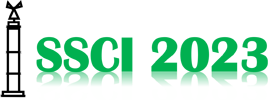Sponsored by the Sociedad Mexicana de Inteligencia Artificial (SMIA). The IEEE SSCI 2023 Best Paper Award recognizes outstanding original contribution to areas related to the field of computational intelligence. The winner of the IEEE SSCI 2023 Best Paper Award receives a certificate and a cash prize of 500 USD. The best papers are those that have been submitted and accepted for publication, and will be presented orally at SSCI 2023.
The selection process for the best paper will involve the following steps:
1) Each associate editor is invited to nominate one or two papers to the award committee.
2) The authors on the shortlist will be asked to confirm their willingness to present orally at SSCI 2023.
3) The award committee will then finalize a list of 5 papers and promptly inform the respective authors.
4) Members of the award committee will attend the presentations of the 5 selected papers during the conference and score them accordingly.
5) At the banquet, certificates will be awarded to the authors of the final list, and the announcement of the best paper will be made.
Finalist
- GOLNAZ Sababipour ASL, Ruppa Thulasiram, Aerambamoorthy Thavaneswarn, Stock Volatility Forecasting with Transformer Network, WeA3.3, #84
- Daniel Heinrich von Eschwege, Andries Engelbrecht, A Cautionary Note on Poli’s Stability Condition for Particle Swarm Optimization, ThB7.2, #145
- Patrick Hoffmann, Kirill Gorelik, Valentin Ivanov, Applicability Study of Model-Free Reinforcement Learning towards an Automated Design Space Exploration Framework, WeB6.6, #231
- Marcos Pérez-Espinoza, Dulce Martinez-Peon, Fernando Góngora Rivera, Xóchitl Ortíz Jiménez, Michelle Contró Esparza, Juan Maldonado-Jauregui, Isaac Tinoco-Ramírez, Francisco Castillo-Herrera, Hector Estrada-Cortez,EMG Classification of Hand and Wrist Force Tasks Using Fractal Algorithms, ThB3.5, #404
IEEE SSCI 2023 Best Paper
- Patrick Hoffmann, Kirill Gorelik, Valentin Ivanov, Applicability Study of Model-Free Reinforcement Learning towards an Automated Design Space Exploration Framework, WeB6.6, #231
